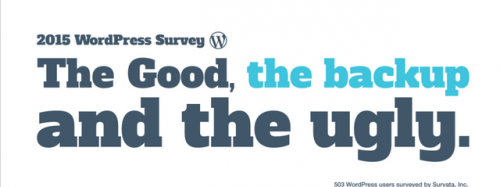CodeGuard, a service that specializes in automated backups to the cloud, has published the results of its 2015 WordPress survey. The survey took place between February 18th-20th and was answered by 503 WordPress users. Backing up is an important part of maintaining a website, so it’s a bit shocking to see such high percentages of people who either don’t backup on a regular basis or who don’t think backup plans are important.
Out of 503 respondents:
- 25% have received “very little training” in the use of WordPress
- 22% haven’t been trained at all in WordPress backup and have “no idea” how to do it
- 21% have seen the “white screen of death” multiple times, and “it’s horrible!”
- 69% have had a plugin fail after an update, and 24% have had it happen “many times”
- 63% have deleted files that were not backed up
- 22% said that a backup plugin seems “unimportant” to them
- 24% said “This site is my livelihood, I’d pay almost anything for a complete restore,” while 19% said they’d be willing to spend several thousand dollars, at least
I’m surprised to see only 24% of respondents use a backup plugin at all considering there’s so many free options available. There appears to be a correlation between those who have little to no WordPress training and the lack of education on how to establish a backup plan. I realize 503 WordPress users is not a large sample size, but the numbers indicate more education is needed on backup software, services, and strategies.
It’s also alarming to see 69% of respondents have had a plugin fail after an update and 24% of those have had it happen several times. This is further proof that WordPress is not ready to automatically update plugins by default.
An important data point missing from the survey is how many of the respondents rely on automatic backups provided by their webhost. Not every user needs a plugin to manage backups and for a number of managed WordPress hosting companies, automatic backups are part of the package. In fact, most managed WordPress hosting providers discourage and disallow backup plugins from being used. An example is WP Engine:
In general, however, we discourage the use of backup plugins. They needlessly duplicate our built-in functionality, rely on a large amount of local storage and can store files in an insecure manner. Not only that, many of these plugins run their backup jobs at inopportune times. This can slow database connectivity with extra — and sometimes very large — MySQL queries and cause timeouts on larger sites.
This infographic provided by CodeGuard visually shows the survey’s results. When browsing, I suggest replacing WordPress users with respondents as WordPress users sounds too broad. After reviewing the data, let me know if the results surprise you or if it corresponds to what you’re experiencing with clients.


Hey Jeff, where do I start? :)
But seriously, a lot of these numbers don’t surprise me at all, as these are the same people I talk to day in and day out, or at least connect with. So let me share my thoughts…
On the backups. This does wrap back around to educating people. I cannot tell you how many sites don’t have something in place. The gray area between whether your host has a dependable backup system in place is was often confuses users. For example, share hosts, even if they say they are backed up, often it’s not what you really need and restoring is not simple, or an extra charge. So a plugin or an extra maintenance service is needed. Then the managed hosts, for example like WPEngine, has a great backup system in place, without the need of any plugins. What is the answer… keep on educating people as much as possible.
As far as wrong, for example with plugins, there are just so many variables. Outdated stuff, conflicts, you name it. People go crazy with plugins and don’t think before they install one. And honestly, it doesn’t help with all these posts out there claiming to tell you about the “must-have” plugins. There are just so many areas that are part of the problem there.
Lastly, the training and education. Again, no surprises. Although there are tons of resources out there, both free and paid when it comes to learning what you need to know, there are just too many other variables. For example, each individuals learning style. And finding the right learning tool or resource out there. I get people coming to me all the time and saying they tried this site, or that site, places I consider good resources, and still have walked away more confused than ever. That’s why we all offer different options, but sometimes, for the user to figure out which works best is time-consuming.
Which brings me to this simple fact. A lot of people still use the “WordPress is so easy” gateway to lure others into it. And the fact is for many, it’s not simple to learn. They come into it, trying to run their own business, and then realize all the time they now need to take to really learn and understand it. And so many just don’t have the luxury of that time.
Well, I could go on forever, but that’s my .op2 :)